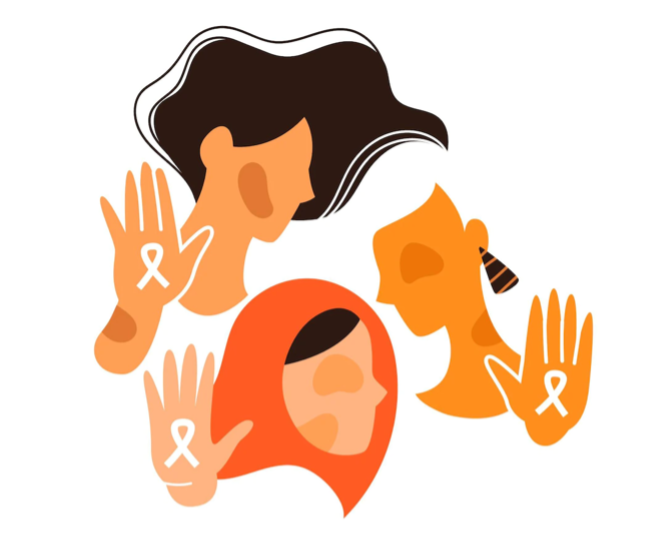Despite all national and international developments and changes, violence against women is still among the important problems in our country and all over the world. As a global problem, domestic violence against women is a serious social problem that needs to be tackled in our country as well. The phenomenon of violence against women encountered at every stage of social life; In addition to being an important public health problem due to the heavy damage to the material and spiritual integrity of women, it also constitutes an obstacle to social and economic development by preventing women's active participation in social life.
According to the definition of the World Health Organization, violence is the direct or indirect application of power and power to another person, self, group or society in a way that causes physical or mental injury and loss. According to the first article of the Declaration on the Elimination of Violence Against Women, adopted by the United Nations General Assembly in 1993; Any act of gender-based violence that results in or is likely to result in physical, sexual or emotional harm to women in the public and private sphere, threat or coercion to commit this act, and arbitrary restriction of freedom. It can be in the form of physical violence, psychological violence, sexual violence and economic violence.
Considering the consequences of violence against women on the mortality (death) of women; murder (homicide in the name of honor, passion killings), suicidal tendencies or suicide can be seen.
Violent behavior learned by witnessing or as a victim of violence tends to be repeated. Therefore, violence actually breeds violence. In children who witness violence; Behaviors such as shyness, irritability and introversion are more common. The risk of child abuse increases. Girls who witness violence normalize the violence and may show a tendency to accept when violence is applied to them. Boys who witness violence may tend to use violence against their wives and children in the future.

In our country, important studies and practices are carried out in the fight against violence against women. VIOLENCE PREVENTION AND MONITORING CENTER (VPMC) is one of them; It is very important in this fight.
VIOLENCE PREVENTION AND MONITORING CENTER (VPMC): These are the centers where security is provided, the situation is evaluated, needs are determined and met. These centers provide psychological, social, economic, legal and health support. All legal proceedings are initiated and followed. Accommodation is provided if needed. In these centers, which are open 24 hours a day, every day of the week, psychologists, social workers, etc. people work. Where there is no ŞÖNİM, these services are carried out by the Provincial Directorates of Family, Labor and Social Services.
Another important application; It is a KADES (Women Support Application) application; It is an official application offered to users in order to prevent bad acts such as violence and harassment that women and children are exposed to. It is an emergency response application prepared by the General Directorate of Security and will come to your mind first in an emergency.
The role of the health worker in Combating Violence Against Women is very important; One of the first occupational groups that women who encounter violence come into contact with is health personnel. Health personnel play an important role in protecting women from violence, creating a security plan or, if necessary, directing them to a shelter. The health worker provides three-stage preventive health services in this regard:
Primary (primary/basic) protection: Preventing violence against women and raising public awareness on this issue
Secondary (secondary) protection: Early diagnosis, giving importance to the privacy and confidentiality of women, and appropriate provision of health services related to physical, mental and reproductive health
Tertiary protection: Mental health and rehabilitation with long-term counseling provision of services.

In some cases, the person may not directly express that he or she has been exposed to violence. In these cases, the physician should consider and question that this may be a case of violence against women. Especially; chronic emotional health problems, harmful behaviors such as alcohol or substance use, repetitive or unexplained injuries, unexplained chronic pain or other chronic conditions, the presence of emotional or behavioral problems in the woman herself or her children are some of these conditions. countable.
The solution of this social problem, which we refer to as violence against women, with an interdisciplinary approach, and involving all relevant parties in the process with its prevention, protection, punishment, socio-cultural and educational dimensions would be the right approach.
As a result, we must be at the point of zero tolerance for violence against women.



 In some cases, the person may not directly express that he or she has been exposed to violence. In these cases, the physician should consider and question that this may be a case of violence against women. Especially; chronic emotional health problems, harmful behaviors such as alcohol or substance use, repetitive or unexplained injuries, unexplained chronic pain or other chronic conditions, the presence of emotional or behavioral problems in the woman herself or her children are some of these conditions. countable.
In some cases, the person may not directly express that he or she has been exposed to violence. In these cases, the physician should consider and question that this may be a case of violence against women. Especially; chronic emotional health problems, harmful behaviors such as alcohol or substance use, repetitive or unexplained injuries, unexplained chronic pain or other chronic conditions, the presence of emotional or behavioral problems in the woman herself or her children are some of these conditions. countable.